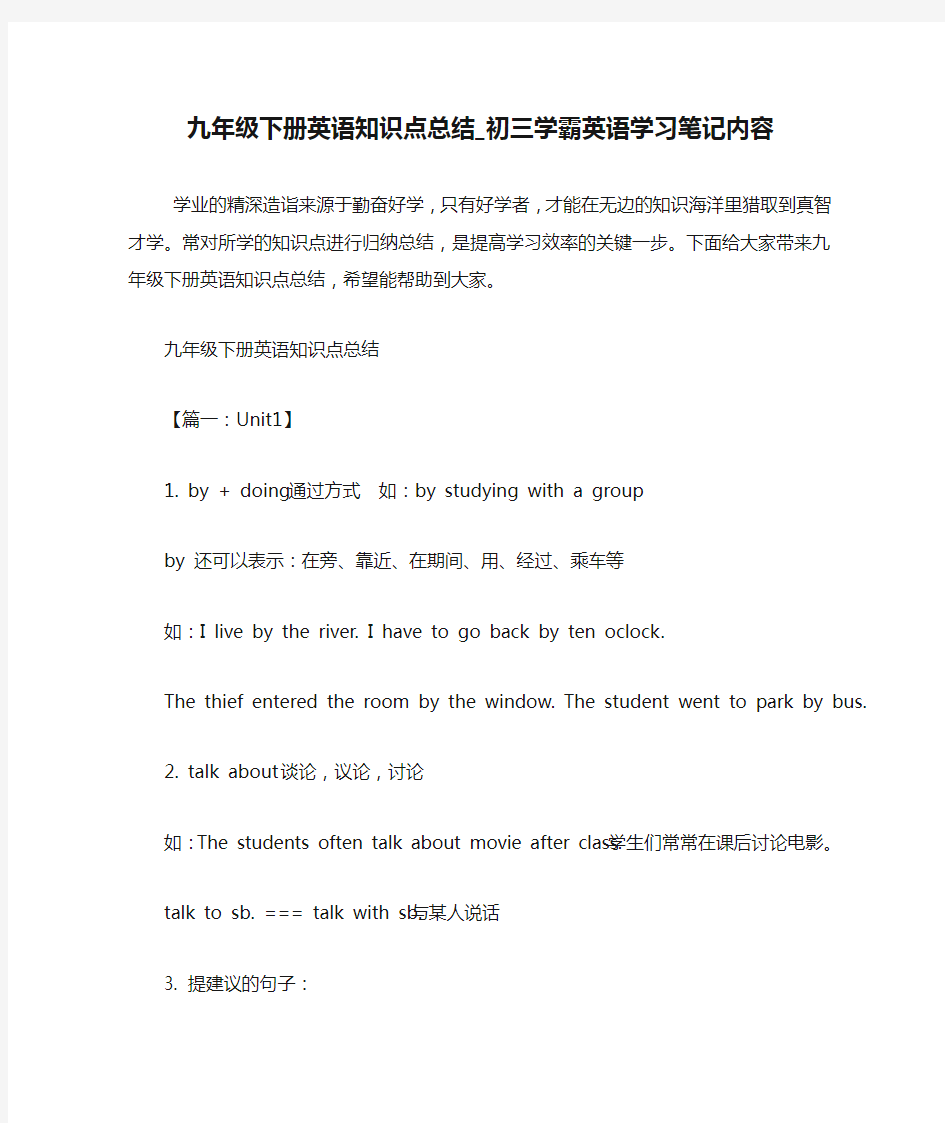
九年级下册英语知识点总结_初三学霸英语学习笔记内容
- 格式:doc
- 大小:29.00 KB
- 文档页数:6


九年级下册英语知识点总结_初三学霸英语学习笔记内容学业的精深造诣来源于勤奋好学,只有好学者,才能在无边的知识海洋里猎取到真智才学。常对所学的知识点进行归纳总结,是提高学习效率的关键一步。下面给大家带来九年级下册英语知识点总结,希望能帮助到大家。
九年级下册英语知识点总结
【篇一:Unit1】
1. by + doing 通过方式如:by studying with a group by 还可以表示:在旁、靠近、在期间、用、经过、乘车等如:I live by the river. I have to go back by ten oclock. The thief entered the room by the window. The student went to park by bus.
2. talk about 谈论,议论,讨论
如:The students often talk about movie after class. 学生们常常在课后讨论电影。
talk to sb. === talk with sb. 与某人说话
3. 提建议的句子:
①What/ how about +doing sth.?
如:What/ How about going shopping?
②Why dont you + do sth.? 如:Why dont you go shopping?
③Why not + do sth. ? 如:Why not go shopping?
④Lets + do sth. 如: Lets go shopping
⑤Shall we/ I + do sth.? 如:Shall we/ I go shopping?
4. a lot 许多常用于句末如:I eat a lot. 我吃了许多。
5. tooto 太而不能常用的句型 too+adj./adv. + to do sth.
如:Im too tired to say anything. 我太累了,什么都不想说。
6. aloud, loud与loudly的用法
三个词都与大声或响亮有关。
①aloud是副词,重点在出声能让人听见,但声音不一定很大,
常用在读书或说话上。通常放在动词之后。aloud没有比较级
形式。如: He read the story aloud to his son.
他朗读那篇故事给他儿子听。
②loud可作形容词或副词。用作副词时,常与speak, talk, laugh等动词连用,多用于比较级,须放在动词之后。如:
She told us to speak a little louder. 她让我们说大声一点。
③loudly是副词,与loud同义,有时两者可替换使用,但往往
含有令人讨厌或打扰别人的意思,可位于动词之前或之后。如: He does not talk loudly or laugh loudly in public. 他不当众大声谈笑。
【篇二:Unit2】
1. used to do sth. 过去常常做某事
否定形式:didnt use to do sth. / used not to do sth.
如:He used to play football after school. 放学后他过去常常踢足球。
Did he use to play football? Yes, I did. No, I didnt. He didnt use to smoke. 他过去不吸烟。
2. 反意疑问句
①肯定陈述句+否定提问如:Lily is a student, isnt she? Lily will go to China, wont she?
②否定陈述句+肯定提问如:
She doesnt come from China, does she?
You havent finished homework, have you?
③提问部分用代词而不用名词 Lily is a student, isnt she?
④陈述句中含有否定意义的词,如:little, few, never, nothing, hardly等。其反意疑问句用肯定式。如:
He knows little English, does he? 他一点也不懂英语,不是吗?
They hardly understood it, did they?他们几乎不明白,不是吗?
3. play the piano 弹钢琴
4. ①be interested in sth. 对感兴趣
②be interested in doing sth. 对做感兴趣
如:He is interested in math, but he isnt interested in speaking
English. 他对数学感兴趣,但是他对说英语不感兴趣。
5. interested adj. 感兴趣的,指人对某事物感兴趣,往往主语是人
interesting adj.有趣的,指某事物/某人具有趣味,主语往往是物
6. still 仍然,还
用在be 动词的后面如:Im still a student.
用在行为动词的前面如:I still love him.
7. the dark 天黑,晚上,黑暗
8. 害怕 be terrified of sth. 如:I am terrified of the dog.
be terrified of doing sth. 如:I am terrified of speaking.
【篇三:Unit3】
1. allow sb. to do sth. 允许某人做某事(主动语态)如: Mother allows me to watch TV every night. 妈妈允许我每晚看电视。
be allowed to do sth. 被允许做某事(被动语态)如:
LiLy is allowed to go to Qinzhou. 莉莉被允许去钦州。
2. get their ears pierced 穿耳洞